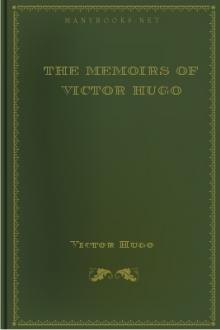Toilers of the Sea by Victor Hugo (trending books to read txt) 📕

- Author: Victor Hugo
- Performer: -
Book online «Toilers of the Sea by Victor Hugo (trending books to read txt) 📕». Author Victor Hugo
It was a wondrous palace, in which death sat smiling and content.
XIII WHAT WAS SEEN THERE; AND WHAT PERCEIVED DIMLYA place of shade, which yet was dazzling to the eyes—such was this surprising cavern.
The beating of the sea made itself felt throughout the cavern. The oscillation without raised and depressed the level of the waters within, with the regularity of respiration. A mysterious spirit seemed to fill this great organism, as it swelled and subsided in silence.
The water had a magical transparency, and Gilliatt distinguished at various depths submerged recesses, and surfaces of jutting rocks ever of a deeper and a deeper green. Certain dark hollows, too, were there, probably too deep for soundings.
On each side of the submarine porch, rude elliptical arches, filled with shallows, indicated the position of small lateral caves, low alcoves of the central cavern, accessible, perhaps, at certain tides. These openings had roofs in the form of inclined planes, and at angles more or less acute. Little sandy beaches of a few feet wide, laid bare by the action of the water, stretched inward, and were lost in these recesses.
Here and there seaweeds of more than a fathom in length undulated beneath the water, like the waving of long tresses in the wind; and there were glimpses of a forest of sea plants.
Above and below the surface of the water, the wall of the cavern from top to bottom—from the vault down to the depth at which it became invisible—was tapestried with that prodigious efflorescence of the sea, rarely perceived by human eyes, which the old Spanish navigators called praderias del mar. A luxuriant moss, having all the tints of the olive, enlarged and concealed the protuberances of granite. From all the jutting points swung the thin fluted strips of varech, which sailors use as their barometers. The light breath which stirred in the cavern waved to and fro their glossy bands.
Under these vegetations there showed themselves from time to time some of the rarest bijoux of the casket of the ocean; ivory shells, strombi, purple-fish, univalves, struthiolaires, turriculated cerites. The bell-shaped limpet shells, like tiny huts, were everywhere adhering to the rocks, distributed in settlements, in the alleys between which prowled oscabrions, those beetles of the sea. A few large pebbles found their way into the cavern; shell-fish took refuge there. The crustacea are the grandees of the sea, who, in their lacework and embroidery, avoid the rude contact of the pebbly crowd. The glittering heap of their shells, in certain spots under the wave, gave out singular irradiations, amidst which the eye caught glimpses of confused azure and gold, and mother-of-pearl, of every tint of the water.
Upon the side of the cavern, a little above the water-line, a magnificent and singular plant, attaching itself, like a fringe, to the border of seaweed, continued and completed it. This plant, thick, fibrous, inextricably intertwined, and almost black, exhibited to the eye large confused and dusky festoons, everywhere dotted with innumerable little flowers of the colour of lapis-lazuli. In the water they seemed to glow like small blue flames. Out of the water they were flowers; beneath it they were sapphires. The water rising and inundating the basement of the grotto clothed with these plants, seemed to cover the rock with gems.
At every swelling of the wave these flowers increased in splendour, and at every subsidence grew dull again. So it is with the destiny of man; aspiration is life, the outbreathing of the spirit is death.
One of the marvels of the cavern was the rock itself. Forming here a wall, there an arch, and here again a pillar or pilaster, it was in places rough and bare, and sometimes close beside, was wrought with the most delicate natural carving. Strange evidences of mind mingled with the massive stolidity of the granite. It was the wondrous art-work of the ocean. Here a sort of panel, cut square, and covered with round embossments in various positions, simulated a vague bas-relief. Before this sculpture, with its obscure designs, a man might have dreamed of Prometheus roughly sketching for Michael Angelo. It seemed as if that great genius with a few blows of his mallet could have finished the indistinct labours of the giant. In other places the rock was damasked like a Saracen buckler, or engraved like a Florentine vase. There were portions which appeared like Corinthian brass, then like arabesques, as on the door of a mosque; then like Runic stones with obscure and mystic prints of claws. Plants with twisted creepers and tendrils, crossing and recrossing upon the groundwork of golden lichens, covered it with filigree. The grotto resembled in some wise a Moorish palace. It was a union of barbarism and of goldsmith's work, with the imposing and rugged architecture of the elements.
The magnificent stains and moulderings of the sea covered, as with velvet, the angles of granite. The escarpments were festooned with large-flowered bindweed, sustaining itself with graceful ease, and ornamenting the walls as by intelligent design. Wall-pellitories showed their strange clusters in tasteful arrangement. The wondrous light which came from beneath the water, at once a submarine twilight and an Elysian radiance, softened down and blended all harsh lineaments. Every wave was a prism. The outlines of things under these rainbow-tinted undulations produced the chromatic effects of optical glasses made too convex. Solar spectra shot through the waters. Fragments of rainbows seemed floating in that transparent dawn. Elsewhere—in other corners—there was discernible a kind of moonlight in the water. Every kind of splendour seemed to mingle there, forming a strange sort of twilight. Nothing could be more perplexing or enigmatical than the sumptuous beauties of this cavern. Enchantment reigned over all. The fantastic vegetation, the rude masonry of the place seemed to harmonise. It was a happy marriage this, between these strange wild things. The branches seeming but to touch one another clung closely each to each. The stern rock and the pale flower met in a passionate embrace. Massive pillars had capitals and entwining wreaths of delicate garlands, that quivered through every fibre, suggestive of fairy fingers tickling the feet of a Behemoth, and the rock upheld the plant, and the plant clasped the rock with unnatural joy of attraction.
The effect produced by the mysterious reconciliation of these strange forms was of a supreme and inexpressible beauty.
The works of nature, not less than the works of genius, contain the absolute, and produce an impression of awe. Something unexpected about them imperiously insists on our mental submission; we are conscious of a premeditation beyond our human scope, and at no time are they more startling than when we suddenly become aware of the beauty that is mingled with their terror.
This hidden grotto was, if we may use the expression, siderealised. There was everything in it to surprise and overwhelm. An apocalyptic light illuminated this crypt. One could not tell if that which the eyes looked upon was a reality, for reality bore the impress of the impossible. One could see, and touch, and know that one was standing there, and yet it was difficult to believe in it all.
Was it daylight which entered by this casement beneath the sea? Was it indeed water which trembled in this dusky pool? Were not these arched roofs and porches fashioned out of sunset clouds to imitate a cavern to men's eyes? What stone was that beneath the feet? Was not this solid shaft about to melt and pass into thin air? What was that cunning jewellery of glittering shells, half seen beneath the wave? How far away were life, and the green earth, and human faces? What strange enchantment haunted that mystic twilight? What blind emotion, mingling its sympathies with the uneasy restlessness of plants beneath the wave?
At the extremity of the cavern, which was oblong, rose a Cyclopean archivolte, singularly exact in form. It was a species of cave within a cave, of tabernacle within a sanctuary. Here, behind a sheet of bright verdure, interposed like the veil of a temple, arose a stone out of the waves, having square sides, and bearing some resemblance to an altar. The water surrounded it in all parts. It seemed as if a goddess had just descended from it. One might have dreamed there that some celestial form beneath that crypt or upon that altar dwelt for ever pensive in naked beauty, but grew invisible at the approach of mortals. It was hard to conceive that majestic chamber without a vision within. The day-dream of the intruder might evoke again the marvellous apparition. A flood of chaste light falling upon white shoulders scarcely seen; a forehead bathed with the light of dawn; an Olympian visage oval-shaped; a bust full of mysterious grace; arms modestly drooping; tresses unloosened in the aurora; a body delicately modelled of pure whiteness, half-wrapped in a sacred cloud, with the glance of a virgin; a Venus rising from the sea, or Eve issuing from chaos; such was the dream which filled the mind.
It seemed improbable that no phantom figure haunted this abode. Some woman's form, the embodiment of a star, had no doubt but shortly left the altar. Enveloped in this atmosphere of mute adoration the mind pictured an Amphitryon, a Tethys, some Diana capable of passion, some idealistic figure formed of light, looking softly down in the surrounding dusk. It was she who had left behind in the cave this perfumed luminosity, an emanation from her star-body. The dazzling phantom was no longer visible, she was only revealed by the invisible, and the sense of her presence lingered, setting the whole being voluptuously a-quiver. The goddess had departed, but divinity remained.
The beauty of the recess seemed made for this celestial presence. It was for the sake of this deity, this fairy of the pearl caverns, this queen of the Zephyrs, this Grace born of the waves, it was for her—as the mind, at least, imagined—that this subterranean dwelling had been thus religiously walled in, so that nothing might ever trouble the reverent shadows and the majestic silence round about that divine spirit.
Gilliatt, who was a kind of seer amid the secrets of nature, stood there musing, and sensible of confused emotions.
Suddenly, at a few feet below him, in the delightful transparence of that water like liquid jewels, he became sensible of the approach of something of mystic shape. A species of long ragged band was moving amidst the oscillation of the waves. It did not float, but darted about of its own will. It had an object; was advancing somewhere rapidly. The object had something of the form of a jester's bauble with points, which hung flabby and undulating. It seemed covered with a dust incapable of being washed away by the water.





Comments (0)